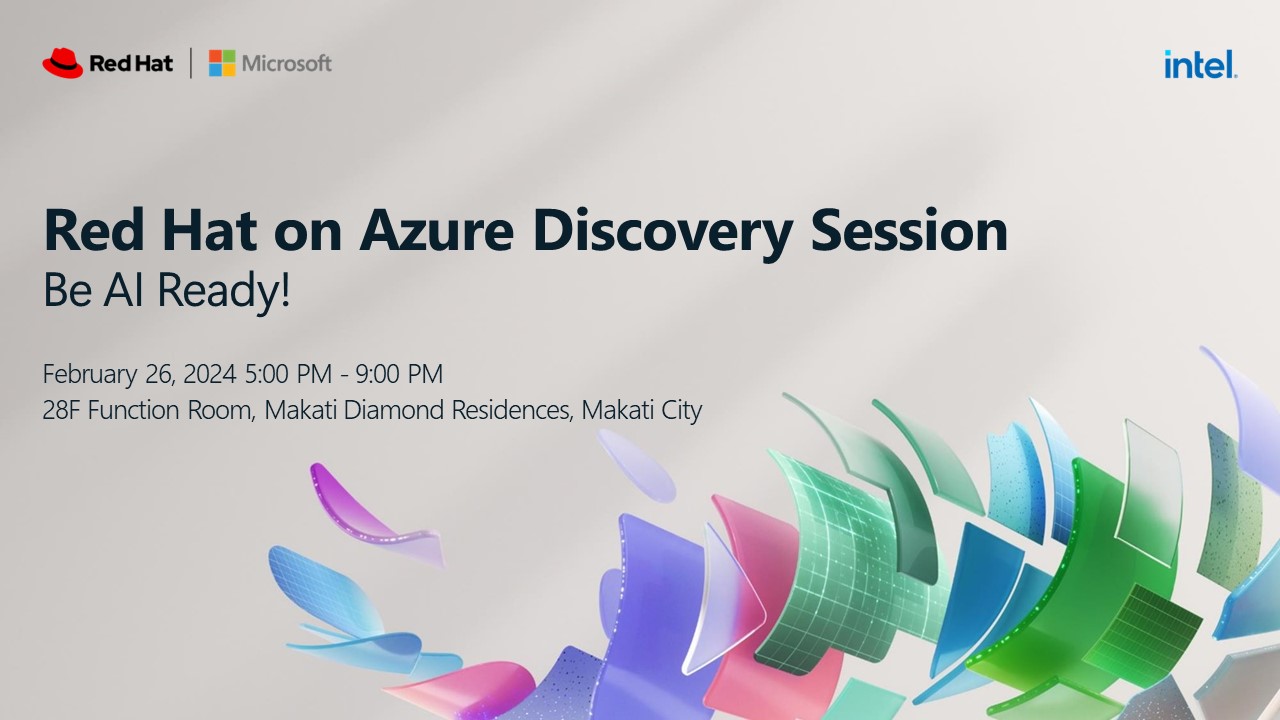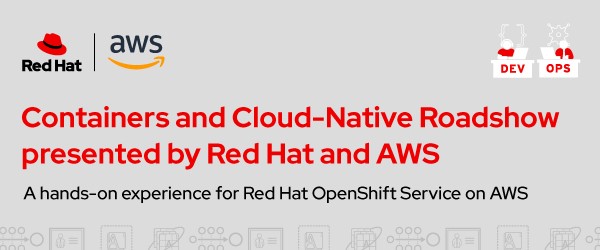Join us for the Modern Application Development Roadshow – customized for business leaders, you will walk away with an understanding of application modernization trends, strategies, and best practices as well as cloud-native development models. Don’t miss your chance to gain insight into industry best practices on modernizing your workloads and taking your hybrid cloud application modernization approach to the next level.
For operations track – we will provides hands-on experience configuring, administering, and managing Red Hat® OpenShift®, and it’s coming to a city near you! Attendees will learn how to apply the fundamentals of operating OpenShift clusters, deploy and manage multiple clusters, discover security vulnerabilities across multi-cluster deployment, and enforce security policies.
For developers track – get the hands-on experience to learn how to assess, analyze, refactor and deploy an application for modernization. Explore how Red Hat® Runtimes and Red Hat Application Services let you develop Kubernetes native, container first, serverless applications and how Kafka, API management, and integration can enhance your application portfolio.
Space is limited
Date: 8th March 2023, Wednesday
Time: 9.00am – 5.30pm GMT+8 (registration starts at 8.30am)
Venue: Orchard A & B, Ascott Bonifacio Global City,
5th Avenue, corner 28th St,
Taguig, 1634 Metro Manila, Philippines
Overview
The Modern Application Development Roadshow is a unique, thought leadership and hands-on experience that showcases how organizations rely on Red Hat® OpenShift® and related offerings to develop and modernize applications on a hybrid cloud platform. A single-day experience, the roadshow caters to business leaders on high-level methodologies, industry best practices, and engagement strategies and developer and operations practitioners with tailored hands-on labs that explore modern tooling, techniques, and architectures.
What you’ll learn and experience
- Which workloads should be prioritized for application modernization and how they can be migrated to a hybrid cloud application platform.
- Full immersion into cloud-native development models and how they can be implemented to build modern applications across your organization.
- Hands-on overview of application services, with particular emphasis on Kafka, API management, and integration, and how they can enhance your application portfolio.
- Decision makers and business leaders will learn application modernization strategies, techniques, and industry best practices
Who should attend
- IT decision makers
- IT directors
- Infrastructure architects
- Infrastructure specialists
- Enterprise architects
- Developers
- DevOps engineers
- Application architects
- Developer team leads
Know before you go
Infrastructure- and operations-focused participants should have knowledge of systems administration, storage, and operations with these suggested tools or skills:
- Competency on the Linux® command line.
- A general understanding of Linux containers (e.g., Docker, CRI-O, etc.).
- A general understanding of authentication (e.g., LDAP/AD).
- A laptop computer running Windows, MacOS, or Linux with the Firefox or Chrome web browser.
Application- and developer-focused participants are expected to be familiar with general application development concepts and have basic skills in these areas:
- Java programming.
- Apache Maven build tool.
- Linux command line and Red Hat OpenShift command line.
- Linux containers and Docker.
- Entry-level Kubernetes concepts.
If you have any questions about this event, please contact echan@redhat.com.
Note
Red Hat is committed to the health and safety of our customers, partners, and employees. All attendees will be expected to follow Red Hat and local guidelines regarding COVID-19. Please do not attend if you are feeling ill or have any symptoms of a viral infection. Please note that all protocols are subject to change.
Agenda
| Time |
Agenda |
| 8:30:00 AM |
Registration |
| 9:00:00 AM |
Welcome Address
Beyond Linux: How Red Hat extends to the cloud
We are going to talk about the evolution of the company from its humble beginnings making software for single servers—to a company whose software allows developers to harness the power of the cloud. Red Hat’s software provides the tools and platform your teams need to innovate and effectively deploy, manage, and maintain your applications and states, wherever they exist. |
| 9:10:00 AM |
Keynote Address
Accelerate innovation: Open hybrid cloud leads to your future—faster
Red Hat provides consistent turnkey application development platforms and cloud services allowing cloud-native application development and application modernization across all footprints: on-premise, public cloud, and at the edge. Learn about our open hybrid cloud solutions and the unique advantages of choosing Red Hat® Cloud Services for your transformation journey. |
| 9:30:00 AM |
Fireside Chat with Customer |
| 9:50:00 AM |
Are your applications hybrid cloud ready? The top considerations while migrating applications
In this session, we’ll focus on best practices and considerations for your organization when migrating applications to a managed cloud services environment.
We’ll cover:
- The customer benefits of migrating to the cloud and factors to consider when making this decision.
- The top things to consider while migrating applications to hybrid environments.
- Common tooling, process, and skills required for successful migration.
- An overview of Red Hat® Cloud Services offerings including platform, application, and data services.
- Considerations for application migrations to a managed Red Hat cloud service.
|
| 10:20:00 AM |
Bridge the clouds with a hybrid operating model
We have evolved from data centric workloads. Today we are focused on service centric solutions by taking a step from public cloud to hybrid and multi cloud, but that does not stop there. We need to extend the architecture to the edge closer to the customers providing better services and creating new revenue streams. How do we bridge these different footprints in a consistent manner? In this session you will walk away understanding how Red Hat customers are architecting, developing and operating applications at scale in a secured and automated manner across different environments and foot prints. |
| 10:40:00 AM |
Continuous delivery with GitOps and Red Hat OpenShift
GitOps has become a standard in deploying applications to Kubernetes and is a common methodology adopted by many companies for their DevOps and cloud-native strategy. In this session, we’ll review useful methods and examples to follow GitOps practices on Kubernetes and apply them to cloud deployments.
You’ll learn:
- How to move continuous integration and continuous delivery (CI/CD) processes to the cloud.
- The best practices to consider for getting started with GitOps on Red Hat® OpenShift®.
- The possibilities of Tekton, ArgoCD, Pelorus, and more on Red Hat OpenShift Service on AWS
|
| 11:10:00 AM |
Coffee Break |
| 11:30:00 AM |
Connect your clouds using a strategic automation platform
Every hybrid cloud incorporates some degree of workload portability, orchestration, and management across diverse environments. Whether your hybrid cloud takes an infrastructure-first approach—like a public cloud attached to your private cloud; multiple public clouds; or some combination of bare-metal, virtual, and cloud environments—or is a hosted cloud-native application, Red Hat® Ansible® Automation Platform can manage, coordinate, and operationalize them under a single set of processes and policies. |
| 12:00:00 PM |
Partner Session |
| 12:20:00 PM |
Closing Remarks |
| 12:30:00 PM |
Networking Lunch |
|
Developer Track |
Operations Track |
| 1:30:00 PM |
Module 1: Refactor and Deployment |
Module 1: Fundamentals of OpenShift |
| 2:30:00 PM |
Module 2: Enable CI/CD Pipeline and GitOps |
Module 2: Improving Security Across Hybrid Cloud |
| 3:30:00 PM |
Coffee Break |
Coffee Break |
| 3:45:00 PM |
Module 3: Build Event-driven Architecture |
Module 3: Multi-Cluster Management |
| 4:45:00 PM |
Module 4: Putting the Ops back into DevOps CI/CD Pipelines |
Module 4: Server Provisioning, Patching and Day 2 Management |
| 5:30:00 PM |
End Of Event |


